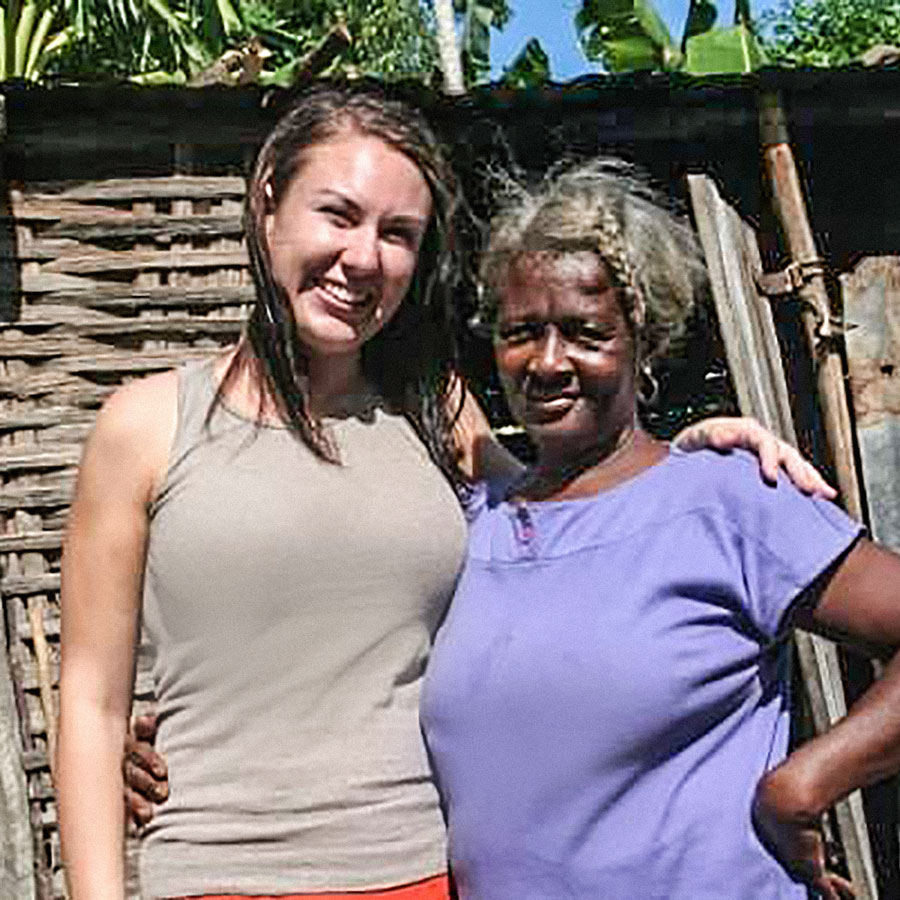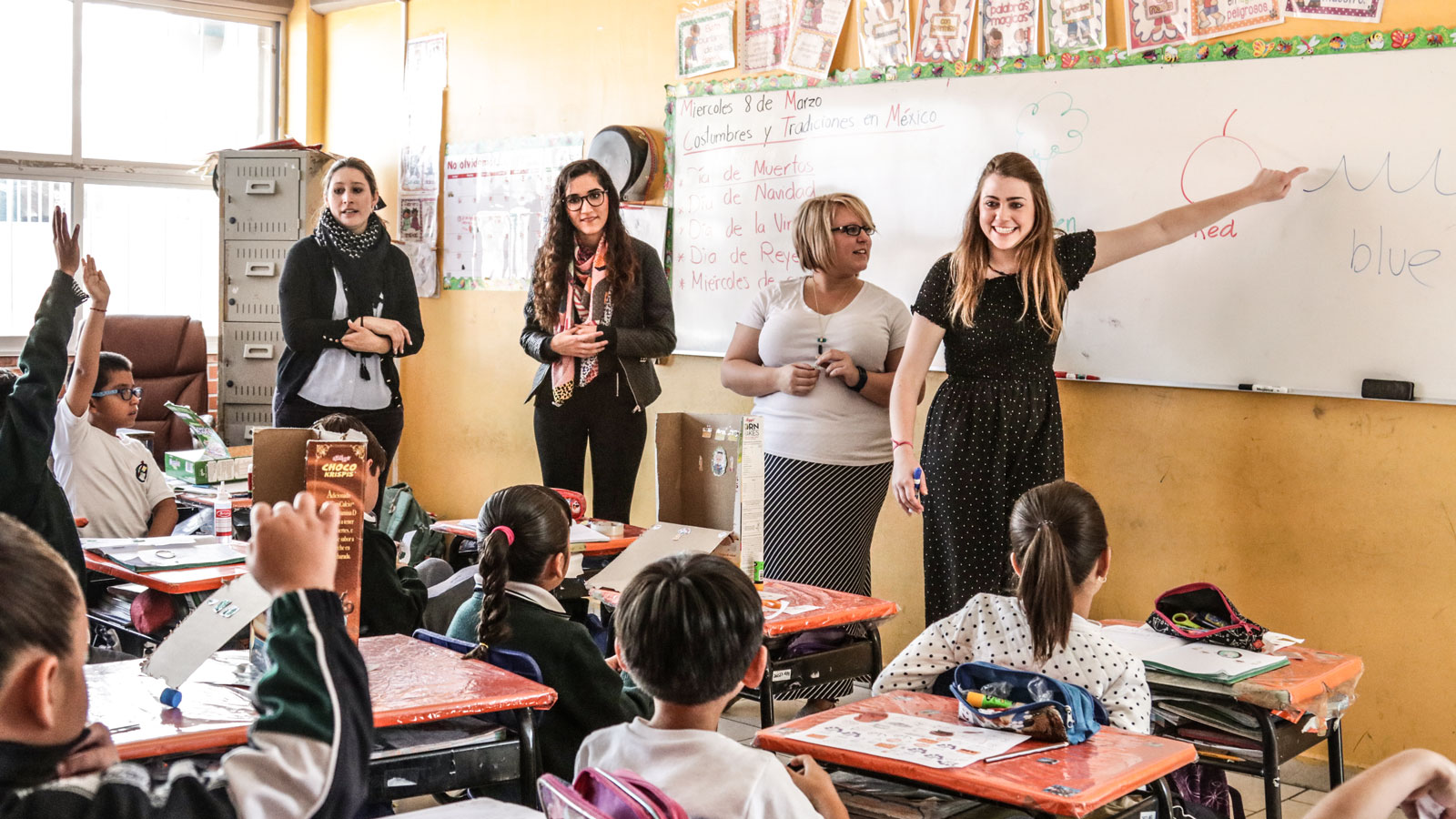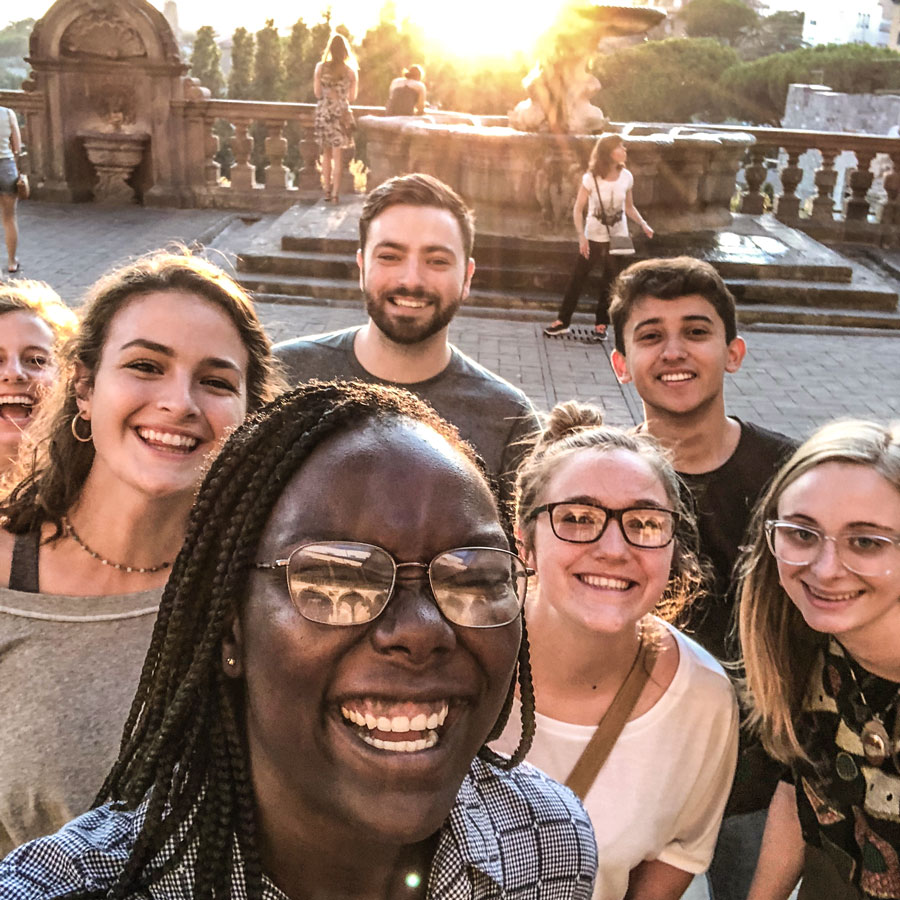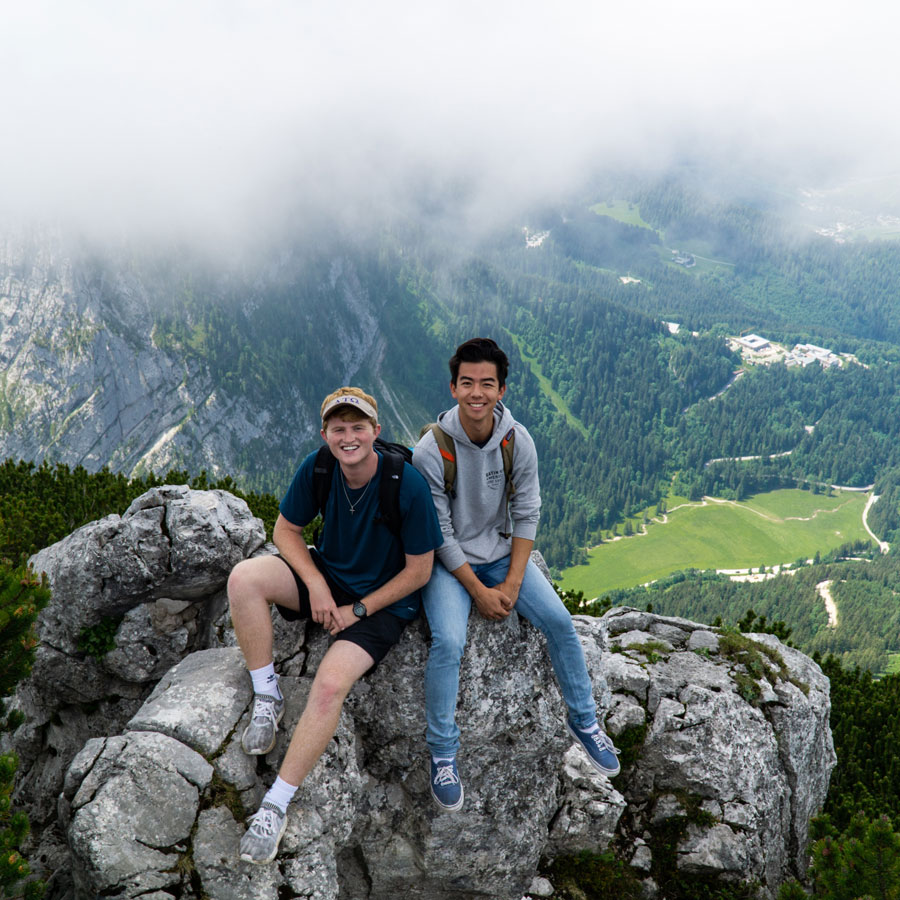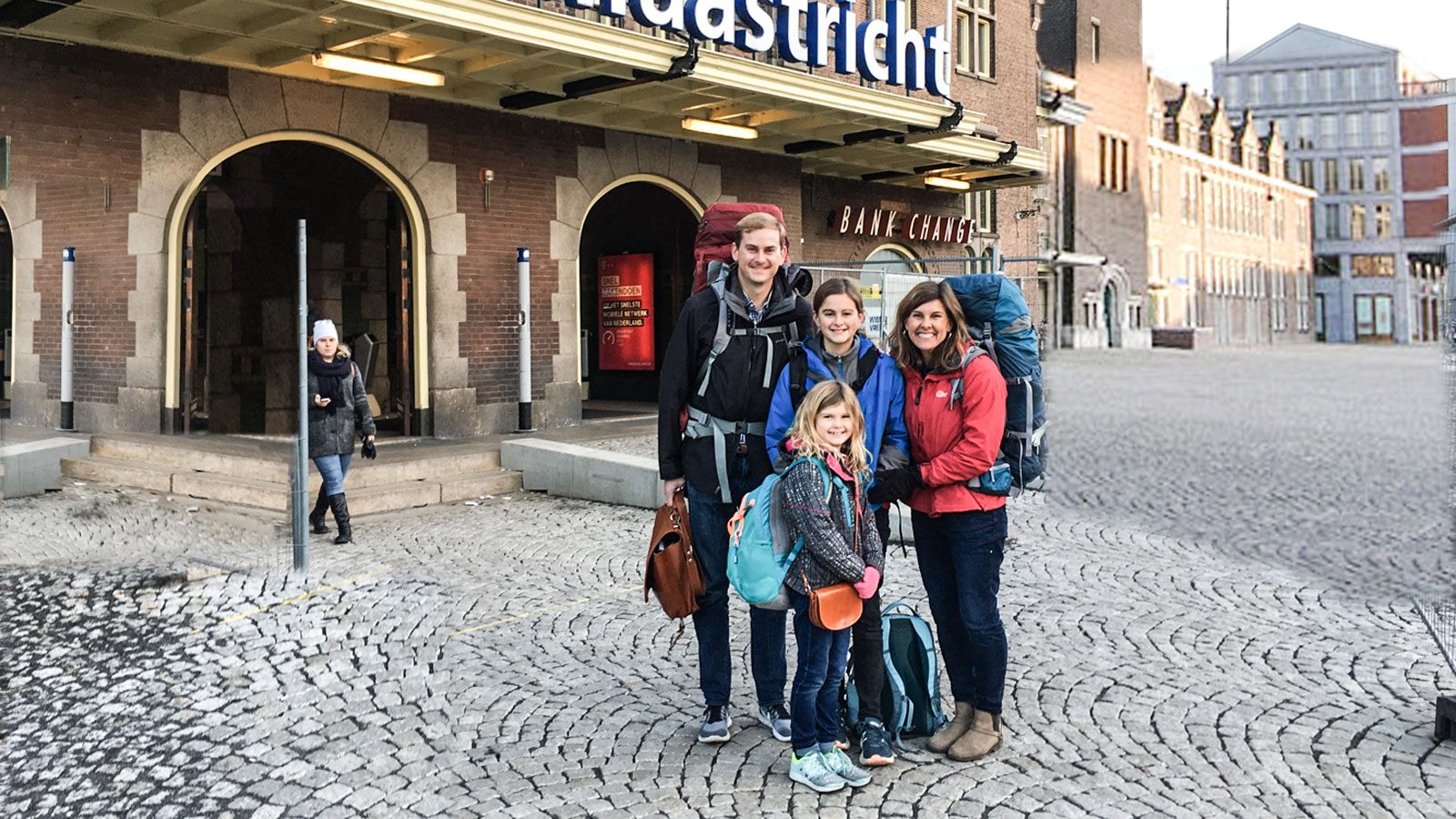A Global Perspective
Students learn leadership and service skills for an increasingly global society through Baylor's study abroad programs.
Megan Rapp, BA ’07, participated in both the Honors Program and the Baylor Interdisciplinary Core, double-majoring in French and economics. As challenging as those programs are, she credits the four months of studying economics at Sorbonne Université in Paris during her junior year with profoundly shaping her character and informing her career.
“Studying abroad was a total game-changer for me. Most importantly, I learned French,” Rapp says. “Of course, I had taken French in school and got good grades on my tests, but I didn’t really speak French until studying at the Sorbonne under French professors and among an international student population.”
Rapp’s classmates at the Sorbonne represented 20 to 30 countries, and she was exposed to economic challenges to the developing world. This helped her understand, for the first time, that she was a citizen of a world beyond her hometown of Des Moines, Iowa, beyond Baylor University, beyond Paris.
Today, she works for the U.S. Agency for International Development (USAID), structuring private finance for businesses in developing West Africa and teaches a course in development finance at Columbia University.
“Since I studied in Paris 13 years ago, I have traveled or worked in 47 countries, of which 21 have been in Africa and many of which I’ve visited multiple times,” Rapp says. “It’s amazing how demystifying a study abroad experience can be — how it can lead to more travel.”
“Studying abroad was a total game-changer for me. Most importantly, I learned French.”
Like Rapp, numerous Baylor undergraduates are deeply impacted and forever changed through their studies abroad. Humbling and empowering, these unforgettable experiences allow hundreds of Baylor students every year the chance to “embed” within cultures, political climates and ways of life that are vastly different from their own. Whether Baylor students choose to spend a portion of the summer, a semester or even a full year abroad, their time away plays a significant role in a truly transformational undergraduate education.
Bo White, director of study abroad in Baylor’s Center for Global Engagement, says students learn life lessons when forced out of their comfort zone in unfamiliar territory where they are forced to examine their beliefs. This leads them to question what they believe about the world.
“That happens in study abroad almost immediately,” White says. “The things we have on campus that make life relatively easy — meal plans, parking spaces, student clubs — often, those amenities aren’t there. That’s helpful because student self-awareness is accelerated. The ability of the student to examine and understand what he or she believes is accelerated.”
The task of travel itself provides an opportunity for personal growth, tapping previously unknown wells of patience and perseverance. Few understand this better than Jenny Wang, senior biology major from Denver and study abroad intern in Baylor’s Center for Global Engagement. Wang, who studied in London at the Foundation for International Education (FIE) during fall 2017, remembers a harrowing day when she planned to catch a ferry from the port at Harwich, England, to the Netherlands.
“My family was visiting, and there had been a train accident that day, so all trains heading east [toward Harwich] were canceled,” Wang says. “The only other option was a bus, but it was scheduled to arrive after our ferry’s departure time. We made the somewhat crazy decision to hire an Uber to Harwich. We then hit traffic leaving London; a fire hydrant had broken, flooding the street and slowing us down even more.”
After Murphy’s Law played out in textbook fashion, Wang says, “We nearly missed our ferry, but somehow, we made it and finally reached Amsterdam.”
Wang chose Baylor in London FIE because the coursework helped fulfill her minor in business administration and the program included an internship — both well-reasoned and practical considerations. Wang says her time in London is “one of the best semesters of [her] life” and that it broadened her worldview.
“I was a little shocked to find that a lot of American stereotypes actually applied to me, and I hated that,” she says. For instance, before studying abroad, Wang says she wasn’t terribly interested in current events. Now, however, she makes a daily effort to stay informed, keeping up with national and international affairs.
“Being aware of what’s happening in the world is a significant part of British culture,” she says. “Through my internship at St. Luke’s Community Centre, I witnessed the growing disparity between the different socioeconomic classes in London, and I got to interact with a lot of the population, which was very eye-opening. While I was there, Brexit was and still is a huge topic of debate. It was fascinating to hear the variety of opinions firsthand.”
Study Abroad Options Abound
Perhaps Baylor’s earliest faculty-led excursion abroad is detailed in an article published in the Feb. 4, 1901, issue of The Lariat. Dr. Henry Lee Hargrove, then a faculty member and English department chair 1903-1912, discussed plans to take his wife, young daughter and six to nine Baylor students on a two-month, trans-Atlantic journey, including planned stays in “the great cities of Europe.”
“I’ve witnessed more maturation in my students and that surge of self-sufficiency in the context of study abroad than at any other point in their degree program.”
“We sail from New York July 1 [1901] on the Rotterdam … two months of travel abroad will give as much culture as two years of college,” Hargrove was quoted as saying. “Travel enlarges the mind, enriches the soul, and vitalizes the things of history, art, literature.”
Today, of course, intercontinental travel is vastly more efficient, and Baylor’s study abroad program is more formalized. The website bearsabroad.baylor.edu provides a searchable catalogue of more than 100 study abroad options to suit every major on campus.
Current study abroad programs, White explains, can be divided into three categories:
As the name suggests, international exchange programs, involve “exchanging” one or two Baylor students for one or two students from a university abroad for a single semester or a full academic year.
A second category includes Wang’s experience through FIE in London, a private, non-profit organization that works with a number of U.S. universities.
“Baylor contracts with a few highly reputable institutions and organizations, including SAI [saiprograms.com], Cultural Experiences Abroad [ceastudyabroad.com] and CIEE [ciee.org],” White says. “We vet these organizations and establish contracts with them that allow our students to study at any number of universities abroad.”
Thirdly, there are more than 40 faculty-led study abroad programs to choose from. These are programs that Baylor faculty and staff have built over time, with the oldest being Baylor in Great Britain.
“We offer two semester-long [faculty-led] options there — Baylor in St Andrews, at the University of St Andrews in Scotland, and Baylor in Maastricht at Maastricht University in the Netherlands,” White says. “Those are unique models in the sense that the faculty design a course or courses they will teach while they’re abroad, and the students matriculate to the partner institution, returning to Waco with a transcript from an international university.”
The majority of faculty-led programs take place during the summer within a five- or six-week period. Groups stay either in a single city or hop around to multiple sites. Formal assignments may be required along the way; museums, hotel lobbies or city park benches sometimes serve as classrooms. The experience of unfiltered immersion and encounters with different cultures comprise the bulk of the education taking place.
“Also, there is something special about having access to a Baylor faculty member who is an expert in his or her field, and who also cares about the students enough to engage them in that new environment,” White says. “Then, you add the fact that faculty and students are actively engaging the community in which they are guests. That’s transformational.”
Mutual Gains
Approximately 40 faculty-led study abroad programs and counting mean that impactful experiences abroad aren’t just for students. Faculty from across Baylor’s academic units who serve as study abroad program directors are involved with everything from student recruitment on the Waco campus to instruction, mentorship and as-needed support in a foreign city. Program directors design and teach courses specific to their academic training and areas of expertise.
“Baylor students want to give back; they come here with an attitude that they’re part of a larger world, and they would like to make a difference and be a positive force. Our programs allow students to explore that more fully.”
In his 18 years of teaching, Maxey Parrish, BA ’78, MSEd ’93, senior lecturer in the Department of Journalism, Public Relations and New Media (JPRNM) in the College of Arts and Sciences, has led student trips to Rwanda, Armenia, Australia, South Africa,
Nicaragua, Ghana, Spain, Ukraine and other Eastern European countries. This summer, he will lead Baylor in Budapest, taking a group of journalism students to Prague, Czech Republic, and Budapest, Hungary, with a brief stay in neighboring Romania.
“This will be my fourth summer leading Baylor in Budapest. It’s a beautiful city with a lot of art and architecture and good public transportation,” Parrish says. “I use the setting as a tool to help teach travel writing.”
Biannually, JPRNM students produce The Bundle, an online magazine that Parrish’s group uses over the summer as a platform for travel-related storytelling.
“In Budapest, I’m not telling students what to write about or film or photograph. They have to go out and find the stories themselves,” Parrish says. “Someone will have a story idea; they talk to me about it, and we think about sources. Another student has photographs to contribute and a video component to supplement the story. I’m more of a coach than a teacher in this setting. I’m with the students every day, and we can work together on every aspect of the finished product.”
Austria Arnold, a senior journalism major from Terrell, Texas, says her weeks in Budapest — and her work on a particular story for The Bundle — represent a time of immense personal growth, and that her travels left her changed for the better. One of Arnold’s stories, “Pastries with a Publisher,” involved an interview with Dr. József Bayer, CEO of Central and Eastern European-based Ringier Axel Springer Media AG.
“To get to his office, I had to navigate an unfamiliar part of Budapest. I was well outside my comfort zone,” Arnold says. “Dr. Bayer was so kind and helpful, and his passion for giving back to a new generation of journalists inspired me.”
For Parrish, watching his students mature in real time is its own reward. Encouraging this rapid evolution, he intentionally avoids the type of housing accommodations that cater specifically to American tourists and designs a scavenger hunt in Budapest so that students are made to navigate the city on their own.
“Many of our students come to Baylor from rather sheltered backgrounds,” Parrish says. “I’ve witnessed more maturation in my students and that surge of self-sufficiency in the context of study abroad than at any other point in their degree program.”
Baylor in Maastricht is perhaps the most popular faculty-led study abroad option, accepting 40 students during the fall and spring combined, with Summer I and II options offered, as well. Maastricht is a mere train ride from several iconic Western European cities.
Tiffany Hogue, BA ’95, clinical professor of higher education leadership and policy, joined the inaugural Baylor in Maastricht cohort in fall 1995 and returned to Maastricht as program director in fall 2017. She is slated to direct Baylor in Maastricht a second time this fall along with her husband Andy Hogue, MA ’05, PhD ’09, Honors Program senior lecturer.
“Joining Baylor in Maastricht as an undergraduate broke open my view of the world. Then, when we led the fall 2017 cohort, those 19 students joined our family and changed our lives,” Tiffany says. “We taught them in small seminars, shared meals multiple times per week, traveled together and hosted them in our flat every Sunday evening for months. It’s not often in adulthood that you can say something truly changed your life — the birth of a child, the death of a loved one or a serious illness, perhaps. Taking Baylor students abroad changed our lives deeply and irrevocably.”
Global Baylor: Increasing Study Abroad Accessibility
Behind-the-scenes diligence by everyone at the Center for Global Engagement and the strength of the University’s global partnerships ensure that all study abroad programming reinforces the University mission.
“If [Baylor] is about leadership and service in a caring Christian community, then each of our study abroad programs must reflect that,” White says. “By and large, Baylor students want to give back; they come here with an attitude that they’re part of a larger world, and they would like to make a difference and be a positive force. Our programs allow students to explore that more fully.”
Last August, ahead of the University’s reaccreditation by the Southern Association of Colleges and Schools Commission on Colleges (SACSCOC), the Center for Global Engagement launched Global Baylor: Addressing Challenges to Human Flourishing, Baylor’s Quality Enhancement Plan (QEP). The QEP seeks to prepare Baylor students to live in an increasingly global community where challenges to human flourishing — in health, in economic opportunity, in political and religious freedom, and in all areas of human existence — are of paramount concern.
Among four specific initiatives within the QEP are Diversity Abroad, which makes international travel opportunities more accessible to Baylor students from diverse and underrepresented racial, ethnic and socioeconomic backgrounds, and Enhanced International Travel Experiences, which will provide more experiential learning abroad opportunities.
“Last summer, under the QEP’s Diversity Abroad initiative, Baylor’s First in Line program identified a cohort of 40 incoming first-generation college students — First Abroad Fellows — each of whom expressed interest in studying abroad,” Dr. Jeff Hamilton, vice provost for global engagement, says. “Following their first year of study, each First Abroad Fellow will receive a $3,000 scholarship to support a study abroad experience.”
In the coming years, each new cohort of First Abroad Fellows will meet with Global Baylor staff for regular advising. Bobby Leis, assistant director of Global Baylor, says pastoral care is a part of these meetings, in which students are asked about how they are adapting to University life.
“‘How’s the semester going? How’s your major fitting for you? How’re your grades?’ We’re addressing these kinds of concerns,” Leis says. “We’re looking at other obstacles such as obtaining a passport, which can be confusing for first-timers.”
Global Baylor welcomed all interested students to the inaugural Passport Fair in February. The U.S. Postal Service was invited to campus, provided white backdrops for passport photos and guided students through the application paperwork required by the U.S. Department of State. Global Baylor provided all First Abroad Fellows with a $200 passport scholarship to offset the application cost.
The Enhanced International Travel Experiences initiative includes several elements — the first of which is to provide, at no additional expense, more opportunities for undergraduate students to study abroad within the context of their normal coursework. Students enrolled in the Social Issues in Education class will have the opportunity to travel to Querétaro, Mexico, this spring with Rick Strot, senior lecturer in the School of Education. Similarly, a group of students enrolled in Environmental Law will travel to Vancouver, Canada, with Julie King, lecturer in the College of Arts and Sciences’ environmental science department.
“The other aspect of Enhanced International Travel is developing courses in new locations and new areas of study that attract and include students from as broad a range of disciplines, backgrounds and interests as possible,” Hamilton says.
Some examples of forthcoming programs include a global health program in Zambia co-led by Dr. Beth Lanning, BSEd ’89, MSEd ’91, associate chair of the Department of Public Health in Baylor’s Robbins College of Health and Human Sciences, and Dr. Lori Spies, assistant professor and missions coordinator in Baylor’s Louise Herrington School of Nursing; a business program in Brazil led by Dr. Lourenco Paz, associate professor of economics in Baylor’s Hankamer School of Business; and an Honors Program/Baylor Interdisciplinary Core program on Pacific Asian culture in Hawai`i led by Dr. Candi Cann, associate professor of religion in the BIC.
White, who encourages students to begin preparing for study abroad as early as their first semester, says Baylor works to make study abroad accessible and affordable for all students.
“I encourage students to come see us early and often,” he says. “We tell students to really explore program options. If the program your friend is joining is a little bit more expensive than your budget allows, it doesn’t mean you can’t study abroad at all.”

